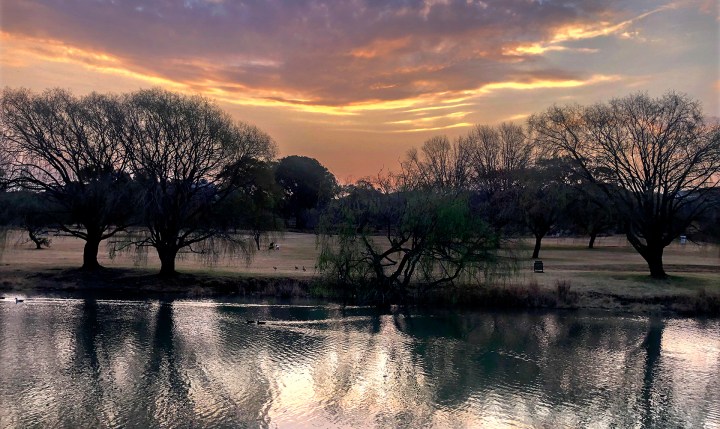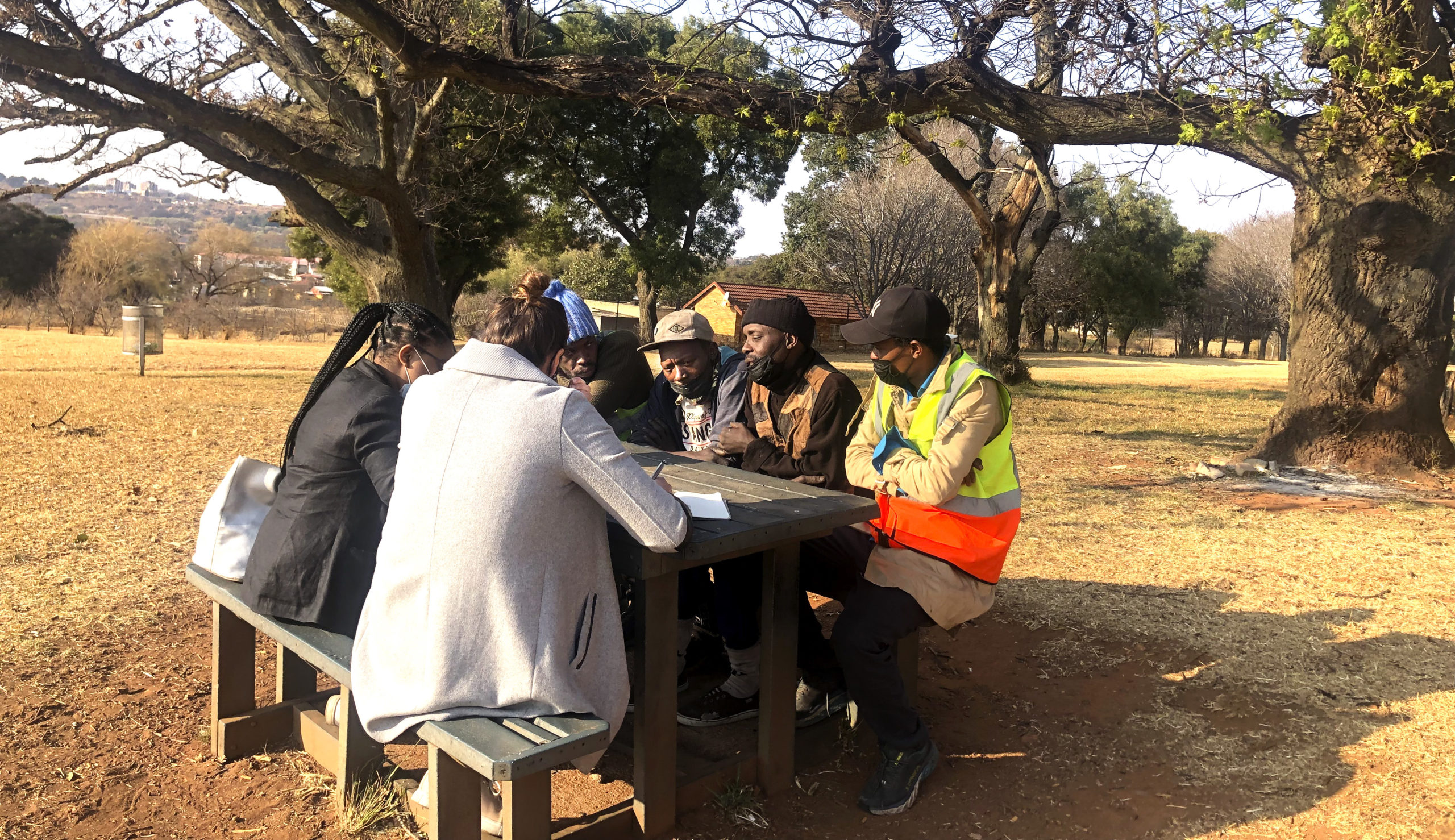Maverick Citizen: Tuesday Editorial
Finding ourselves: Alberts Farm, the right to dignity and the meaning of ‘Everyone’

Instead of protesting about the values our country has adopted, the put-upon residents would do better to see that the court order has presented them with an opportunity. It requires that all the parties ‘meaningfully engage with each other to ensure that an equitable and dignified relationship can be developed’. The best way to preserve the beauty and peace of the park would be to take up this offer.
In June 2021, Maverick Citizen published an article, Why Can’t We Live Together?, reporting on the fencing of Alberts Farm, a public park in western Johannesburg, and about the fear of the homeless people who lived in the park that the fence would be a prelude to their evictions.
Through interviews we let the homeless people speak for themselves, talk about their lives and the efforts they too had made to keep the park clean, safe and biodiverse.
My hope in writing the article was that some of the more privileged residents of the area, particularly members of a voluntary organisation called the Friends of Alberts Farm Conservancy (FoAFC), would recognise the dignity of people living in makeshift shelters in the park. I hoped that they would develop empathy and see the homeless as stakeholders and potential partners, people with whom a local compact might be struck that would protect both the park and the small number of people who live within it.
My hopes were in vain.

Collecting water from the only artesian well in Gauteng situated in the park. People come to collect water from all over Gauteng. (Photo: Mark Lewis)
Alberts Farm, it turns out, is a microcosm of all the micro-hostilities and prejudices, suspicions and fears that divide our neighbourhoods. Indeed, several of the park’s users seem to be people who, not satisfied with the privilege of having their own private gardens, want to appropriate the park’s space as well.
They are willing to be occasional dispensers of charity and piece jobs to the people who live in the park, but cannot see them as equals.
The fact that the article gave the homeless a voice, and raised questions about the governance of the park, and the legality of the fence, clearly caused resentment and insult.
Over the following days anger manifested on various Facebook pages: the subtext of the comments was that poor people live on the tolerance of their homed neighbours, they can be seen – but not heard.
These resentments culminated on Friday, 13 August.
On that morning several residents, one of them the leader of a local NPO called Let’s Work, which seems to specialise in harassing homeless people, accompanied by the JMPD, Pikitup and City Parks and Zoo, demolished a shelter shared by four men (including those who featured in my article) and removed most of their belongings.
On the coldest weekend of this winter they were left without even their meagre possessions.
The eviction team made it clear that they intended to come back to remove other homeless people from the park.
Then the raiders of the lost park went home, posted pictures and boasted about their actions on a community WhatsApp group. When one resident politely questioned their conduct he was told to “Read up on your by-laws” and “give me your address… I will happily arrange for all the ‘homeless’ to be dropped off at your home so that they can live and squat in your garden.”

Oscar T and Matthew T, the ‘sheriffs of Alberts Farm’, stand beside the gravestones of the Alberts family, the original owners of the farm.
(Photo: Mark Heywood)
However, the anti-rainbow warriors had forgotten that South Africa is a country held together by a Constitution and rule of law. They had forgotten that we founded our new country on a set of fundamental rights that belong to “everyone”, regardless of social origin or race. These include dignity, privacy (“which includes the right not to have their possessions seized”) and housing (“not to be evicted from their home, or have their home demolished, without an order of court made after considering all the relevant circumstances.)”
They had also perhaps overlooked that many people still do care. As a result a small group of active citizens worked with the homeless people on an urgent court application to challenge their eviction (the court papers are accessible here). With the pro bono assistance of lawyers from Power Singh Inc, exactly one week later the court order was granted, and the residents and the government were given 24 hours to “return makeshift tents and building materials, wood, clothing, shoes, food, mobile phones and waste for recycling, and any other items which were removed, as soon as possible”.
Sadly though, the saga wasn’t quite over.
The City of Johannesburg Metro, which every year squanders tens of millions of precious rands in wasteful expenditure and corruption and tops Corruption Watch’s list of “municipalities most implicated in corruption-related reports”, revealed it was willing to comply with the letter but not the spirit of the court order. The next day, it returned to the four homeless men a fraction of their possessions, a few broken pieces of wood, one mattress and a few thin blankets.
The building material was brought on a Let’s Work bakkie full of stinking rotten meat on its way to a dump.
On a windswept Saturday afternoon it took yet another intervention and threat of a contempt of court application before the City of Johannesburg’s lawyer kindly took it upon himself to go and buy four tents, sleeping bags and mattresses. With that done the four men felt an injustice had been rectified.
In a small way justice had been served.
They prepared for another night in the park, without water, without toilets, without electricity. But with their dignity and rights recognised.
In one park, in one small corner of South Africa, for four people and other members of the homeless community, the Constitution had proved its mettle.
Finding Empathy and Overcoming Anxiety
However, the story is far from over.
Enforcing the letter of the Constitution is one thing – actively embracing its spirit is another.
The next day, the Alberts Farm conservancy Facebook page was once more abuzz with vitriol: one resident responded “we’re in trouble now, watch the rush”; another exclaimed “where did they get the money to sue?? Then surely they can afford to legally go rent a house somewhere.”
But instead of protesting about the values our country has adopted, the put-upon residents would do better to see that the court order has presented them with an opportunity. It requires that all the parties “meaningfully engage with each other to ensure that an equitable and dignified relationship can be developed”. The best way to preserve the beauty and peace of the park would be to take up this offer. But this will require a change in mindset by the members of the FoAFC.
How can we get there? Is it asking too much? Let me give you a pointer.
The Turkish/English/everywhere novelist Elif Shafak recently started a digital platform called Say Your Word (find it here). Shafak, who believes in the power of storytelling to restore our humanity, argues that “language is the key to understanding and unlocking our world. It is also the key to the human heart.” Shafak says that developing a better understanding of the meaning of everyday words is vital to shaping our thoughts and actions in what she calls this “age of anxiety”.
In one short video she talks about empathy. She distinguishes empathy from sympathy, a word that embodies “a distance, a hierarchy between the observer and the person who is being observed”.
Empathy, on the other hand, requires us “to walk in the shoes of another person for a few hours or a few days, experience the world through their eyes and see how the world treats you if you were to become that person”. She calls it a humbling journey.
“Connectivity,” says Shafak, “lies at the heart of empathy, the notion that we’re not that separate from each other as human beings.”
In South Africa, the problem is not only that most homed and privileged people lack empathy, but that for many of them their default position is not sympathy, but active antipathy and unfounded suspicion.

Lawyers and clients consult under a tree on Alberts Farm. (Photo: Mark Heywood)
As much as the success of the Constitution’s vision of social justice depends on rule of law and the courts, it also depends on changing this mindset. Alongside empathy (which leads to solidarity), in South Africa’s context a word whose meaning we should embrace is “everyone”, because our whole constitutional vision is premised on the rights of everyone to human dignity.
There are two parts to the word. Every and one. To each person an equal right. To laugh, to cry, to love, to develop, to dream, to excel, to care…
Every one.
Think about it.
Everyone.
If the friends of Alberts Farm took this as their starting position, if they listened to other people’s stories, there is a good chance that they would find a solution that protects both nature’s dignity and beauty (and the park is very beautiful) and the people who by forces of difficult circumstance and history have found themselves living within it.
If they succeeded they might produce a model for other parks and indeed a blueprint for diverse, sustainable and socially cohesive communities everywhere.
We can only hope they now rise to the challenge. DM/MC




















 Become an Insider
Become an Insider
Thank you Mark. This whole episode, starting with the fence, has been so distressing and so indicative of the attitudes of the park ‘protectors’!
This issue is not unique to South Africa or Alberts farm. I live near Seattle and the same intractable story plays out. From my perspective as a South African, the scale of the challenge in the USA is minuscule compared to South Africa, but the trajectories are the same. Compassion is critical to dealing with the challenges, yet the complexities seem intractable.
Even the relatively well-resourced cities of the USA struggle with the issue of homelessness and it is a growing challenge.
I heard about these articles last night at dinner so sought them out to read and digest. The first article, published in June, attracted a number of responses, some thoughtful, some not, but none of them, however pertinent or prejudice-free, has been addressed in this, the follow-up article dated 24 August 2021. Why is this? In the follow-up article the tone remains strident, digital and heavily weighted in favour of homeless people living in the conservancy, i.e homeless = good; residents = bad. This is really poor journalism. I am as appalled by the level of poverty in South Africa coupled with uncaring attitudes as is Mark Heywood. But a conservancy, by definition, is an area of land kept in its natural state, specifically as a protected habitat for wild animals, birds and plants. Why is this not relevant to the discussion? Is Mark Heywood advocating that all Jo’burg parks be opened up for shack-building by homeless people, or only within this conservancy? What is the point of creating parks in cities anyway? I’d be the first to concede that these fences are eyesores and destroy the original purpose of parks. Colonial fencing (maintained) to keep out vehicles and motor bikes should be sufficient. Unfortunately, homeless people often resort to cutting and burning these fences in the winter. All the issues surrounding parks, residents and homeless people need a more nuanced, dare I say balanced, narrative. The two articles I have read are neither nuanced nor balanced.